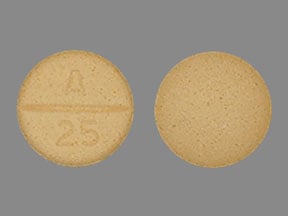
Carbidopa Coupons & Savings Card – Discount Prices from $145.86
Generic for: Lodosyn
Carbidopa (Lodosyn) is used in combination with Sinemet (carbidopa/levodopa) or with levodopa alone to manage symptoms of Parkinson's disease, such as tremors and reduced movement. As a decarboxylase inhibitor, Carbidopa enhances the delivery of levodopa to the brain, where it converts into dopamine to alleviate Parkinson's symptoms. This may allow patients to reduce their levodopa dosage, potentially minimizing its side effects like fatigue, blood pressure changes, alterations in urination, and weight fluctuations. Always consult with your healthcare provider before starting any new medication or treatment.
Our coupons are free to use. Before paying, show the pharmacist your Carbidopa savings card to get your free discount. Use our filters below to edit the prescription box to match your needs. The Carbidopa prices will update based on your prescription needs. Above our Carbidopa coupons, you can change your location to see pharmacy prices and costs in other areas. We're here to help you buy Carbidopa at the lowest price with our prescription discount card.
My prescription
Edit
25MG, Carbidopa (270 Tablets)
Select pharmacy

CVS
$145.86
COUPON PRICE
Albertsons
$207.56
COUPON PRICE
Walgreens
$212.67
COUPON PRICE
Walmart
$350.47
COUPON PRICECarbidopa savings card
Show this card to your pharmacist
CVS
$145.86
BIN
ID
PCN
GRP
019876
LH2E79D255
CHIPPO
LHX
Powered by
Carbidopa (Lodosyn) is used in combination with Sinemet (carbidopa/levodopa) or with levodopa alone to manage symptoms of Parkinson's disease, such as tremors and reduced movement. As a decarboxylase inhibitor, Carbidopa enhances the delivery of levodopa to the brain, where it converts into dopamine to alleviate Parkinson's symptoms. This may allow patients to reduce their levodopa dosage, potentially minimizing its side effects like fatigue, blood pressure changes, alterations in urination, and weight fluctuations. Always consult with your healthcare provider before starting any new medication or treatment.
Our coupons are free to use. Before paying, show the pharmacist your Carbidopa savings card to get your free discount. Use our filters below to edit the prescription box to match your needs. The Carbidopa prices will update based on your prescription needs. Above our Carbidopa coupons, you can change your location to see pharmacy prices and costs in other areas. We're here to help you buy Carbidopa at the lowest price with our prescription discount card.
More prescriptions for Parkinson's disease
coupons from$15.45Save 87%
coupons from$47.05Save 65%
coupons from$407.59Save 77%
coupons from$47.86Save 60%
coupons from$7.61Save 59%
coupons from$757.80Save 53%
coupons from$15.45Save 87%
coupons from$42.64Save 66%
More prescriptions for Parkinson's disease
Carbidopa-levodopa Save 87%coupons from $15.45
Stalevo 100 Save 65%coupons from $47.05
Crexont Save 77%coupons from $407.59
Rasagiline Save 60%coupons from $47.86
Diphenhydramine Hcl Save 59%coupons from $7.61
Ongentys Save 53%coupons from $757.80
Dhivy Save 87%coupons from $15.45
Parlodel Save 66%coupons from $42.64
Carbidopa Anhydrous (Carbidopa) dosage forms
Use our Carbidopa Anhydrous (Carbidopa) 25MG coupon with prices from $145.86 for 270 Tablets. You can also use our Carbidopa Anhydrous (Carbidopa) 25MG coupon with prices from $62.58 for 100 Tablets.
Dosage Quantity Price from Per unit 25MG 270 Tablets $145.86 $0.54 25MG 100 Tablets $62.58 $0.63
| Dosage | Quantity | Price from | Per unit |
|---|---|---|---|
| 25MG | 270 Tablets | $145.86 | $0.54 |
| 25MG | 100 Tablets | $62.58 | $0.63 |
